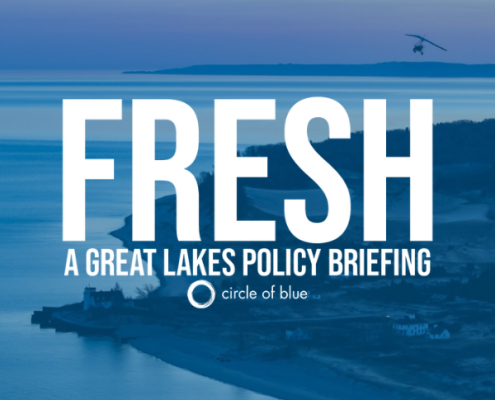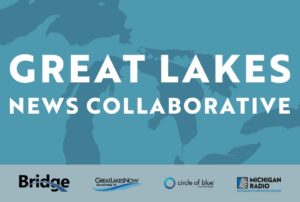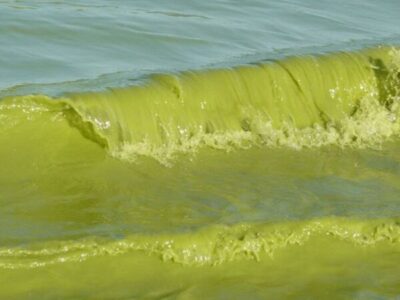
June 27, 2023
Fresh is a biweekly newsletter from Circle of Blue that unpacks the biggest international, state, and local policy news stories facing the Great Lakes region today. Sign up for Fresh: A Great Lakes Policy Briefing, straight to your inbox, every other Tuesday.
— Christian Thorsberg, Interim Fresh Editor
This Week’s Watersheds
- A judge has ordered Canadian company Enbridge to shut down the section of its Line 5 oil pipeline that runs through Ojibwe land in Wisconsin.
- In Tamarack, Minnesota, a planned nickel mine bolsters hopes for electric vehicle manufacturing, but draws concerns over local water resources.
- Wisconsin’s Department of Natural Resources is being taken to court over the state’s Spills Law — a small case that could have a big impact for small businesses.
- A new National Marine Sanctuary is being proposed in Lake Erie.
In Paradise, Michigan, the EPA is deciding the future of a century-old dump that is leaking into Lake Superior.
“Although funding opportunities exist to remove this historic and constant source of pollution into Lake Superior, we are disappointed to learn that the clean-up and remediation of these pollutants has seen little to no movement.” — Whitney Gravelle, president of the Bay Mills Indian Community.
Residents in Paradise, Michigan, are awaiting answers and action regarding a century-old legacy dump in their community. The unlined pit was shut down in 1975 after “people had dumped their vehicles, household appliances, car batteries, paint cans, and drums of creosote into the pit,” Interlochen Public Radio reports.
Today, the dump site has been found to contain high levels of mercury, arsenic, cyanide, chromium, and lead that drain into Lake Superior. Last year, the Bay Mills Indian Community expressed concerns that the pollution violated a 1836 treaty recognizing tribal fishing, hunting, and gathering rights.
Efforts to address the site once and for all are in progress, and the EPA, which is assessing the dump, will decide in the next few months whether the site qualifies for federal cleanup.
Residents hope that a portion of the $1.3 billion allocated for the state environment agency in this year’s state budget will be used to clean up the site. But, per IPR, “the Michigan Department of Environment, Great Lakes, and Energy said some contaminants are above state criteria levels, but the dump site overall, is ‘low risk.’”
Fresh from the Great Lakes News Collaborative

- Environmental group to sue USDA over thousands of beavers being killed in Wisconsin’s trout streams — Michigan Radio
- Did hazardous waste facility’s unreported errors put Detroiters at risk? — Bridge Michigan
- A Better Future: A community fights for a cleaner future, creatively tackling food waste, and The Catch — Great Lakes Now
The Great Lakes News Collaborative includes Bridge Michigan; Circle of Blue; Great Lakes Now at Detroit Public Television; and Michigan Radio, Michigan’s NPR News Leader. We work together to produce news and information about the impact of climate change, pollution, and aging infrastructure on the Great Lakes and drinking water. This independent journalism is supported by the Charles Stewart Mott Foundation. Find all the work here.

Enbridge Hit With Three-Year Shutdown Ultimatum in Portions of Wisconsin
U.S. District Judge William Conley has given energy company Enbridge three years to shut down the section of its Line 5 oil pipeline that runs through Ojibwe land in Wisconsin, Reuters reports.
Finding Enbridge guilty of trespassing on the tribe’s land, Conley also ordered the Canadian company to pay the Bad River Band of Lake Superior Chippewa $5.2 million, plus a portion of the money it makes until the shutdown is complete.
Last month, the Bad River Band called for an immediate shutdown of the pipeline following a period of heavy rains, which eroded a riverbank protecting the pipe. The tribe argued that their land, waters, and wild rice were endangered, though Conley said then that the tribe didn’t prove “an emergency exists,” and was still debating when or how he would deliver a shutdown order.
An Enbridge representative told Reuters that the company plans to appeal the decision.
In the News
Talon Metals: The Talon Metals Corporation is expected “any day” to submit an environmental assessment to Minnesota’s Department of Natural Resources for a proposed underground nickel mine 50 miles west of Duluth, Minnesota Public Radio reports. If successful, Talon says it will provide the only domestic source of nickel with which electric vehicles are manufactured. But not everyone shares the corporation’s optimism. The Mille Lacs Band of Ojibwe, whose communities are just over a mile from the proposed mine, is asking the state to prioritize groundwater over nickel. Grassroots activists also point out that, despite Talon’s best efforts to mitigate environmental harms, this type of mine – where the metal is mixed with sulfide ore – has a track record of pollution risk.
Lake Erie Quadrangle: A lengthy review process has begun for the Lake Erie Quadrangle National Marine Sanctuary, a proposed 740-square-mile underwater park off the coast of Erie, Pennsylvania, including 75 miles of shoreline, the Erie Times-News reports. NOAA, which is currently seeking public comment, says the designation would enhance conservation efforts, cultural heritage opportunities, and recreation space.
Looking Ahead
Spills Law: The Wisconsin Manufacturers and Commerce (WMC) Litigation Center, a nonprofit law firm, has sued the state’s Department of Natural Resources on behalf of small businesses being forced to clean up contamination they didn’t cause, Wisconsin Public Radio reports. The case centers on a couple planning to sell their bike and skateboard shop, which sits, an environmental assessment found, on a contaminated site — likely caused by operations of a gas station some 50 years ago, before the property was transformed. The lawsuit places into question the future interpretation and precedent of the state’s Spills Law, which decides who is responsible for cleaning contaminated property.
Other News
Monarch Point: A new 1,600-hectare conservation reserve, Monarch Point, has been designated in Ontario’s Prince Edward County, CBC reports.
3M Settlement: Minnesota-based chemical manufacturer 3M will pay at least $10.3 billion for contaminating drinking water systems with PFAS “forever chemicals” and other potentially harmful compounds, AP reports.
Catch more news at Great Lakes Now:
FRESH: Bid to Fund Invasive Carp Barrier Falls Short in Minnesota’s State Legislature
FRESH: New Wisconsin Law Aims to Protect Watersheds From Farm Runoff




